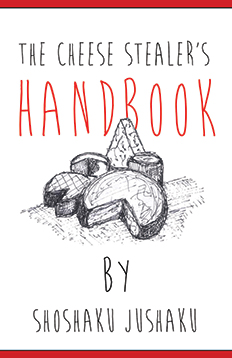Can prose redeem a broken man?
 CREDIT: JPROSPER
CREDIT: JPROSPERThe literary equivalent of a beautiful car crash you can't turn away from.
Difficult to describe, The Cheese Stealer’s Handbook by Shoshaku Jushaku is, in simplest terms, the heartbreaking story of a man during his darkest time. Fighting through desperation, addiction and inner demons, Jushaku speaks with honesty of countless attempts and failures, crying out into the void for meaning and nothing.
Some novels are written with a purposeful mastery, every sentence crafted to touch the reader and blur the line between poetry and prose. This is not one of those novels. Instead, Jushaku gives us the struggle, the parts of writing that feel more like attempting to tame an angry lioness than simply putting pen to paper.
In this battle, however, are surprising moments of clarity and reflection. Mixed in with the harsh grammar and vulgar language are sentences that are near perfection, made more beautiful thanks to the juxtaposition.
Perfection is far from the point of this story. For the most part, the narration guides us through all the wrong choices one could make, guided by an uncontrollable addiction. There are few points where one can agree with the narrator’s actions. Instead, mistake after mistake breaks the heart as one wishes for a better world, a better version of the truth.
Perhaps one of the best things about The Cheese Stealer’s Handbook is how it shuns common literary conventions. A great example of this is the lack of physical descriptions given for the characters. The reader is given some names, occasionally a nationality, but for the most part it’s up to them to imagine the people however they choose.
The lack of description lets us supply our own image of the characters and makes the novel more universal in many ways. It is easy to place yourself in the story, to put on the narrator’s shoes, to feel his struggle in your own bones.
For Canadians, especially those who have been to Montreal or lived in Toronto, there are some great nods to the feeling of those cities. The spirit of these unique places are captured in an original way: “I finally come out into the sunlight and see the Sky Dome and CN tower – like a giant pen stuck to the countertop of Toronto.” It’s hard not to smile at these descriptions, which manage to be both cynical and insightful.
As stated before, this is a novel that really is hard to describe. The lack of intent on the part of the author, stated early and made clear throughout, gives the reader a lot of freedom to interpret the story however they want. Each reader can and will find their own meaning in the words.
The appeal of a story like this, thanks to this freedom, is almost universal. Whether you’re a struggling writer, an addict, a recovering mess or just a person looking to gain greater understanding of what it means to be human, there is something for you in The Cheese Stealer’s Handbook.














